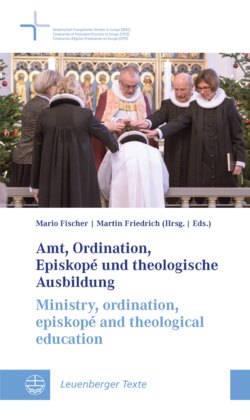Читать книгу Amt, Ordination, Episkopé und theologische Ausbildung / Ministry, ordination, episkopé and theological education - Группа авторов - Страница 25
На сайте Литреса книга снята с продажи.
2.2.3The diaconal ministry
Оглавление48. In addition to the ministry of word and sacraments in the church there is also the ministry of diakonia. In the view of the Reformation diakonia is not a secondary aspect of the life in faith, but belongs to its very nature, according to the will of God: “Likewise, they teach that this faith is bound to yield good fruits and that it ought to do good works commanded by God on account of God’s will and not so that we may trust in these works to merit justification before God.” (CA VI). In a similar way, the Westminster Confession (XVI) underlines: “These good works, done in obedience to God’s commandments, are the fruits and evidences of a true and lively faith: and by them believers manifest their thankfulness, strengthen their assurance, edify their brethren, adorn the profession of the Gospel, stop the mouths of the adversaries, and glorify God, whose workmanship they are, created in Christ Jesus thereunto, that, having their fruit unto holiness, they may have the end, eternal life.”
49. Throughout the history of the church, the practice of “good works” has been carried out in three ways: a) by the service of believers in their everyday lives, b) by the diaconal ways in which the ministry of word and sacraments has been performed, and c) by especially called diaconal ministers. “In being directed not only to members of the church but to all people in need, the diaconate of Christians corresponds to the universality of salvation.”34 It is not only a human service performed in the world. It is the witness of the church to God’s sustaining grace, the compassion of Christ, and the liberating power of the Holy Spirit.35 Although diakonia has a particular focus on the needs of the weak and the marginalised, it represents the concern of the church for all aspects of human life. At the present time, where the churches face the complex challenges of modern society, a trained diaconal office represents an essential part of the church’s holistic mission.
50. The ministry of word and sacraments and the diaconal ministry are not hierarchically ordered, but are interrelated and mutually complementary.36 They belong closely together (cf. Acts 6:1ff.; Rom 12:1–21; Gal 6:2–10). The question whether to ordain deacons or to install them in other ways is a matter where diversity is possible.37
51. The Nordic Lutheran churches have maintained and strengthened the diaconal ministry. Also the United Methodist Church has introduced an “order of deacons” parallel to the “order of elders” (i.e. ministers of word and sacraments). Likewise, the Methodist Church in Britain ordains both deacons and ‘presbyters’ (i.e. ministers). In some Protestant churches deacons are mandated to administer the sacraments in diaconal contexts, such as communion to the sick, but not in the context of public worship. They may, however, play a prominent assisting role in the church’s worship life. In Central and Eastern Europe, by contrast, deacons and deaconesses are generally not ordained, and their tasks refer more to social care, youth work and work for older people. But sometimes they are commissioned to lead worship, which may include administering the sacraments.
